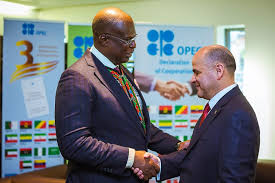There are no products in your shopping cart.
| 0 Items | £0.00 |


NIGERIA'S minister of state for petroleum resources Chief Timipre Sylva has revealed that government subsidies in the sector have effectively ended with the passing of the Petroleum Industry Bill (PIB) by the National Assembly.
Earlier this month, Nigeria's National Assembly passed the long-awaited PIB, which among other things guaranteed 3% of oil proceeds from crude oil exploration to their immediate host communities. According to Chief Sylva, it was best for Nigeria that the federal government discontinued petrol subsidies, stressing that the recently-passed bill had no subsidy provision.
Speaking at the Nigeria/Organisation of Petroleum Exporting Countries: 50 Years of Partnership press conference in Abuja, he said: “This subsidy removal is desirable for the interest and growth of Nigeria. Of course, everybody will have their perspectives but from where I sit, I believe that subsidy removal is the best thing for Nigeria, not just the industry.
“So far, the discussions with stakeholders are still ongoing but I will also bring it to your attention that today, when the president assents to the PIB, subsidy will become a matter of law, because it is already in the PIB that petroleum products will be sold at market-determined prices. The removal of subsidy has the potential of unlocking a lot more funds for deployment to development. Unfortunately, what we are doing by way of subsidy is like cutting our nose to spite our face.”
He further noted that the government would begin the rehabilitation of the Warri and Kaduna refineries soon in order to increase domestic refining of petrol and to cushion the impact of subsidy removal. Chief Sylva added that the Organisation of Petroleum Exporting Countries quota given to Nigeria for crude oil production in June 2021 was 1.554m barrels per day, pointing out that the quota regime had helped in balancing oil prices globally.